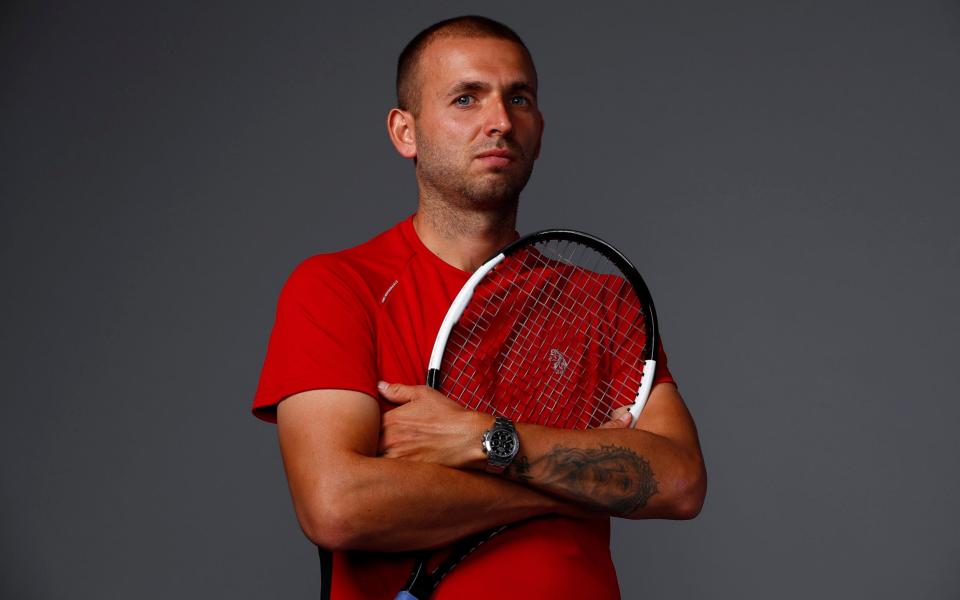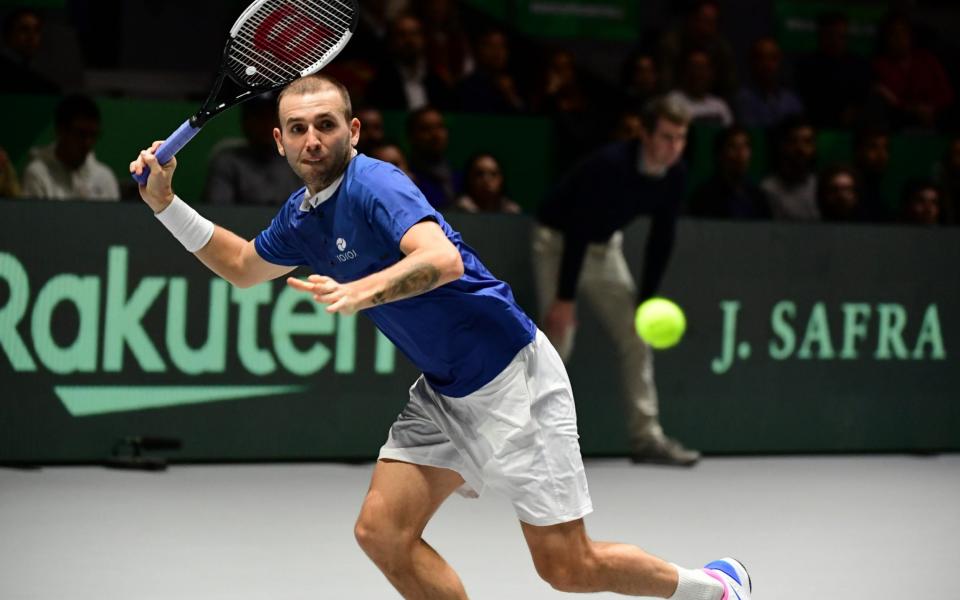Dan Evans, British No 1: I do not take tennis for granted anymore since my drugs ban

On Tuesday, at the National Tennis Centre in south-west London, Andy Murray and Dan Evans traded crosscourt backhands with single-minded focus. This is not unusual; they must have trained together hundreds of times over the last decade. But the dynamic has changed. Where Evans used to be the wayward young understudy, he is now the British No1.
Standing only 5ft 9in tall, and lacking any one trademark shot that can strike fear into his opponents, Evans appears child-like alongside tennis’s dominant strain of six-and-a-half-foot giants. And yet he keeps carving people up with his slice, his touch and his guile. He has taken eight top-20 scalps this year – a tally exceeded only by world No1 Novak Djokovic and the two finalists at the O2 Arena last weekend: Dominic Thiem and Daniil Medvedev.
What is the key to his late-blooming career? Evans, who is 30, cites the 2017 season that he spent in a kind of self-isolation. The exile stemmed from his recreational use of cocaine, and yet there was a curious symmetry with the miseries of 2020. When the pandemic hit, and everyone found themselves slumped in front of daytime TV, he was already an expert at killing time.
“Having that year off was not easy,” Evans told The Telegraph in a Zoom interview. “But I think it’s given me a lot of perspective on what I wanted to do. When I was first on the tour, I took it for granted. I never looked at how we are treated and thought ‘Jeez, this is so good.’ Back then, I probably left a few things to chance and relied on a few other people rather than taking charge of it myself. Even when I got to 40 in the world [shortly before his conviction], I was probably not so focused.
“All that changed when I got back from my ban,” Evans added. “Now I am locked in and I want to make sure I stay there. The situation with Hilts [Mark Hilton, the experienced coach whom Evans broke up with last month] would say that is the case. I want to be professional about it and crack on rather than just stick with a situation that isn’t what I wanted.”

The son of a Solihull electrician, Evans is refreshingly distinct from the cucumber-sandwiches stereotype of English tennis. (As a Scot, Murray stands outside this long and dominant tradition, which runs all the way from Wimbledon’s first champion Spencer Gore to Tim Henman, with a rare interruption for working-class Fred Perry in the middle.)
In a sport where only a fraction of top juniors ever make it, Evans is also a rare example of central funds being lavished on the right target. He was 12 when he left home to train at an LTA Centre of Excellence in Loughborough, staying with a host family during the week and then returning to Hall Green at the weekend. It is no wonder, then, that he recently defended the LTA’s decision to set up a new National Academy on the same site.
But there are other aspects of the governing body that he takes issue with. One of these was Hilton’s “secondment” arrangement, in which he worked for Evans but ultimately reported to (and was paid by) the LTA. Evans wanted to cut the third party out of the deal, but Hilton understandably preferred the stability of a regular salary to the insecurity of touring life.
And then there is the overall strategy. Evans sounds contemptuous when he refers to Simon Timson, the LTA’s recently departed head of performance, who arrived late in tennis via spells working in bobsleigh, cricket, and finally as UK Sport’s performance director for the Rio Olympics.
“Timson didn’t know the game, and so he was targeting more players in the top 100,” Evans explained. “I wanted to say ‘Simon, it’s a bloody tough thing to get to the top 100. It’s not four years of work like you do in the Olympics, and you can throw as much money at it as you want.’ In my opinion we should be concentrating at putting five or six people in the top 250, because that gets you into qualifying for grand slams. Help them out with coaches, and some of those players might grow into playing on the main tour.”
Evans knows all about incremental development. Despite the silky hand skills that marked him out as a teenager, he was almost 26 before he managed a double-digit ranking.
He is a quirky and combative character, opinionated in his banter-heavy chat, but approachable and generous with his time. On the court, his greatest asset has always been his feisty competitiveness – a rare enough trait in the British game, which often produces world-class practice partners. His downfall was that he could resist anything but temptation – particularly when it came in the shape of a night out with his Birmingham mates.
Since the drugs bust, though, a newfound responsibility has set in. “My 2020 has not been so different to any other year,” he said. “I travelled with Aleah [his girlfriend since 2015] anyway, just like I did before Covid. We couldn’t eat out, so there was a lot of ordering in, a lot of Uber Eats. When you look at what was going on in the world, you probably feel a bit guilty if you think it’s a good year. Quietly, though, I would say that’s what it was.”
Break Point: A Davis Cup Story will be available for free on Rakuten TV from 26th November

 Yahoo Sport
Yahoo Sport 





































